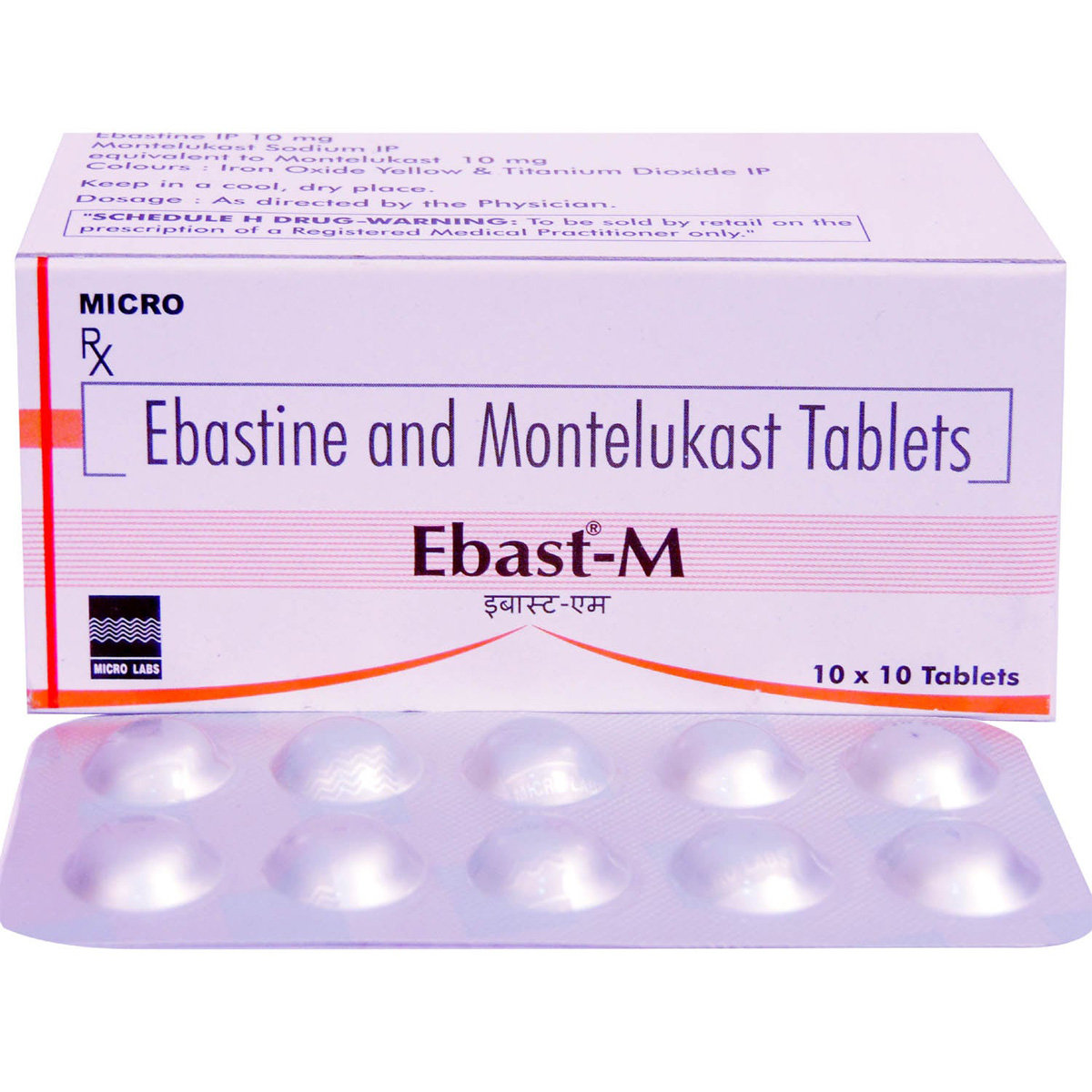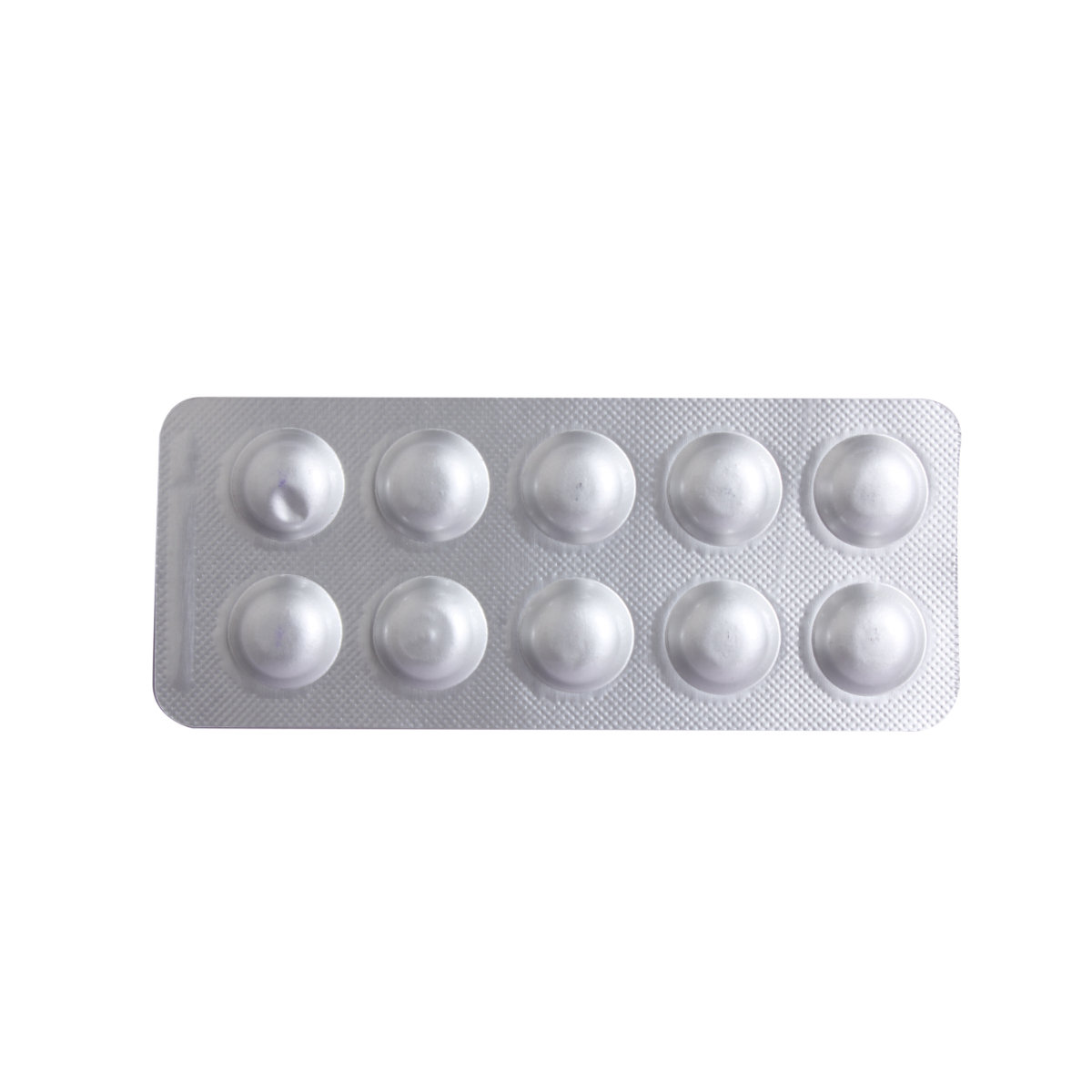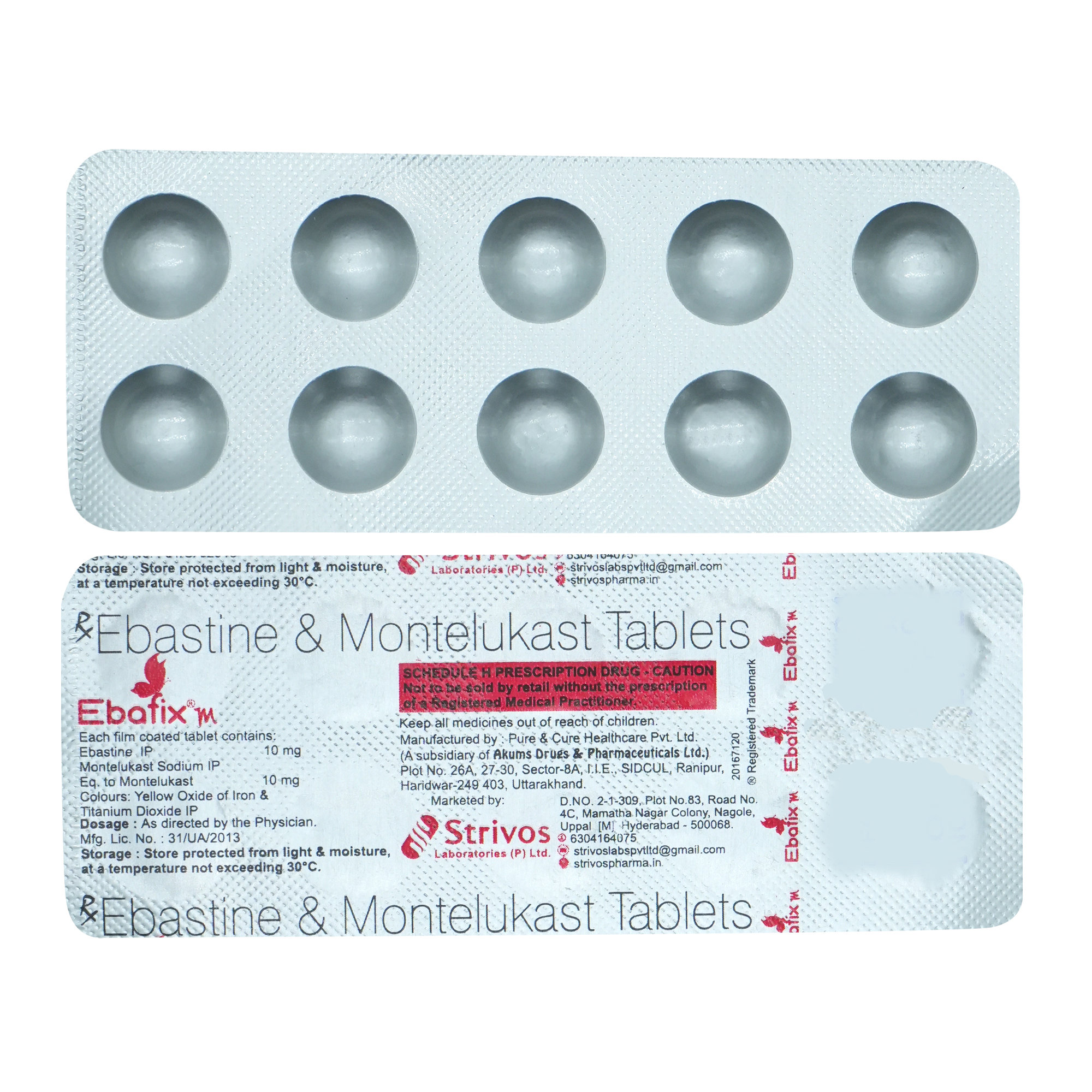Ebastine+montelukast
About Ebastine+montelukast
Ebastine+montelukast belongs to a class of medication called 'anti-allergic' medication, primarily used to treat allergic symptoms like sneezing, runny nose, congestion, stuffy nose or watery eyes. An allergy is the body's natural response to a foreign substance that may or may not be harmful. This is a protective mechanism of the body to keep a person healthy by fighting pathogens. Symptoms of an allergy include sore throat, hives, itching, burning and many more.
Ebastine+montelukast contains Ebastine and Montelukast. Ebastine is an antiallergic which blocks the action of a chemical messenger (histamine) responsible for runny nose, watery eyes and sneezing. Montelukast is a leukotriene antagonist. It works by blocking the action of another chemical messenger (leukotriene). This reduces inflammation (swelling) in the airways and nose and improves symptoms.
Ebastine+montelukast should be as suggested by the doctor. In some cases, Ebastine+montelukast may cause diarrhoea, dryness of mouth, headache, sleepiness, and abdominal pain. These side effects do not require medical attention and will resolve over time. However, if the side effects persist or worsen, please consult the doctor immediately.
If you are allergic to Ebastine+montelukast or any other ingredient present in it, please tell your doctor. If you are pregnant or breastfeeding, it is advised to consult a doctor before using Ebastine+montelukast. If you have serious renal or heart problems, vision problems, or if you are planning to be pregnant, please let your doctor know before taking Ebastine+montelukast. Try not to quit taking Ebastine+montelukast without conversing with your doctor, as it may cause drug withdrawal symptoms.
Uses of Ebastine+montelukast
Medicinal Benefits
Ebastine+montelukast is a combination of two drugs, namely Montelukast and Ebastine. Montelukast is a leukotriene receptor antagonist that blocks the action of chemicals called leukotrienes released from the lungs, causing inflammation (swelling) and increased mucus production in the airways. Thereby reducing inflammation, mucus production and narrowing in the airways. Ebastine is an antihistamine (anti-allergic drug) that blocks the action of histamine, a substance responsible for causing allergic reactions. It helps relieve allergy symptoms such as sneezing, running nose, watery eyes, itching, swelling, and congestion or stiffness.
Directions for Use
Storage
Side Effects of Ebastine+montelukast
- Diarrhea
- Headache
- Dryness in mouth
- Sleepiness
- Upper respiratory tract infection
- Abdominal pain
Drug Warnings
If you are known to be allergic to Ebastine+montelukast or any other medicines, please tell your doctor. If you are pregnant or breastfeeding, it is advised to inform your doctor before using the Ebastine+montelukast. If you notice mood changes while taking Ebastine+montelukast, please consult a doctor immediately. Avoid alcohol consumption with Ebastine+montelukast as it may increase drowsiness. Drive only if you are alert, as the Ebastine+montelukast may cause drowsiness or dizziness in some people. Keep your doctor informed about your health condition and all the medicines you are taking before taking Ebastine+montelukast to rule out any side effects. Inform your doctor if you are suffering from kidney, liver, or heart disease or galactose intolerance or glucose-galactose malabsorption,
Drug Interactions
Drug-Drug Interactions: Ebastine+montelukast may interact with medicines used to treat epilepsy (e.g. phenobarbital and phenytoin), medicines used to treat tuberculosis (e.g. rifampicin), medicines used to treat high-cholesterol (e.g. gemfibrozil).
Drug-Food Interactions: No interactions found/established.
Drug-Disease Interactions: If you have Lapp lactase deficiency, galactose intolerance or glucose-galactose malabsorption, fits, kidney, liver, or heart problems, inform your doctor before taking Ebastine+montelukast.
Drug-Drug Interactions Checker List:
Safety Advice

Alcohol
cautionAlcohol may aggravate the side effects of the $drug, so one should avoid consuming Ebastine+montelukast.

Pregnancy
cautionEbastine+montelukast should not be used when pregnancy unless clearly necessary. So, inform your doctor if you are pregnant or suspect pregnancy. Your doctor will weigh the benefits and potential risks before prescribing Ebastine+montelukast.

Breast Feeding
cautionEbastine+montelukast should not be used in nursing mothers unless clearly necessary. So, inform your doctor if you are a nursing mother. Your doctor will weigh the benefits and potential risks before prescribing Ebastine+montelukast.

Driving
unsafeAvoid doing work that needs complete attention, including driving, as this drug may make a person drowsy.

Liver
cautionLimited information was available for the use of Ebastine+montelukast in patients suffering from liver impairment. Please consult your doctor. Your doctor will prescribe only if the benefits outweigh the risks.

Kidney
cautionLimited information was available for the use of Ebastine+montelukast in patients suffering from kidney impairment. Please consult your doctor. Your doctor will prescribe only if the benefits outweigh the risks.

Children
safe if prescribedEbastine+montelukast is safe to use only if the doctor prescribes it after checking their condition. As dosage for children is different children than adults.
Habit Forming
Diet & Lifestyle Advise
- Add ginger to foods or tea as it contains some anti-inflammatory compounds that can relax membranes in the airways and reduce cough, irritation, and swelling in nasal passages.
- Staying hydrated is vital for those with a cough or cold. Drink liquids at room temperature to get relief from a runny nose, cough, and sneezing.
- The immune system is affected by stress and raises the risk of being sick. Do meditation, deep breathing, regular exercise, and try progressive muscle relaxation techniques to get relief from stress.
- It is advised to avoid contact with known allergens (allergy-causing agents) such as pollen, dust, etc. Certain food items are known to cause allergies to you.
- Maintain personal hygiene and keep your surroundings clean.
Patients Concern
Disease/Condition Glossary
Allergic rhinitis or Allergies is a natural response of the immune system against a substance called an allergen. Hypersensitive responses can happen with anyone, regardless of whether they have not had sensitivities previously. There is a possibility that a person may build up a sensitivity after coming in contact with an allergen more than once. Mild allergy symptoms include wheezing, a runny, blocked nose, swollen, watery eyes, or skin itching. Serious signs of an allergy are difficulty breathing, a rash, or hives. Hypersensitivity is an unexpected response that sometimes turns into a dangerous response and needs quick treatment.
FAQs
Ebastine+montelukast can be taken at any time of the day or suggested by the doctor. However, it works better when a person is resting. This drug also causes drowsiness, so it is best if a person takes a full night's rest after ingesting the drug.
Stopping Ebastine+montelukast without consulting with a doctor may cause drug withdrawal symptoms that can worsen the allergies. It is better to ask the doctor even if you are feeling better, as sometimes the doctor prefers to lower the strength of the drug.
If a person consumes an overdose of medicine, then they should check if they are feeling better. If they are found to have difficulty passing urine, extreme thirst, severe pain in the stomach, or inability to move, they should contact the doctor as soon as they can.
If you miss a portion, avoid the missed dose. Take your next portion at the normal time. Try not to double the dose to make up for missed one. Try not to take more than one dose in 24 hours.
Ebastine+montelukast contains Ebastine and Montelukast. Ebastine is an antiallergic which blocks the action of a chemical messenger (histamine) responsible for runny nose, watery eyes and sneezing. Montelukast is a leukotriene antagonist. It works by blocking the action of another chemical messenger (leukotriene). This reduces inflammation (swelling) in the airways and nose and improves symptoms.
Keep this drug in a tightly closed container and far from the reach of children. Store it at room temperature and away from daylight.
Ebastine+montelukast oral tablet doesn't cause laziness, yet every person reacts differently to the side effects. However, one should avoid performing any task that needs mental alertness.
The use of Ebastine+montelukast is restricted in some conditions, including suicidal thoughts, depression, inflammation of blood vessels in the skin, and anxiety disorder.
One should always tell their doctor about their medical history before taking Ebastine+montelukast. Some of the drugs that can affect the action of the drug include ProAir HFA (albuterol), Spiriva (tiotropium), Symbicort (budesonide/formoterol), Synthroid (levothyroxine), Tylenol (acetaminophen), Ventolin HFA (albuterol), Vitamin B12 (cyanocobalamin).






